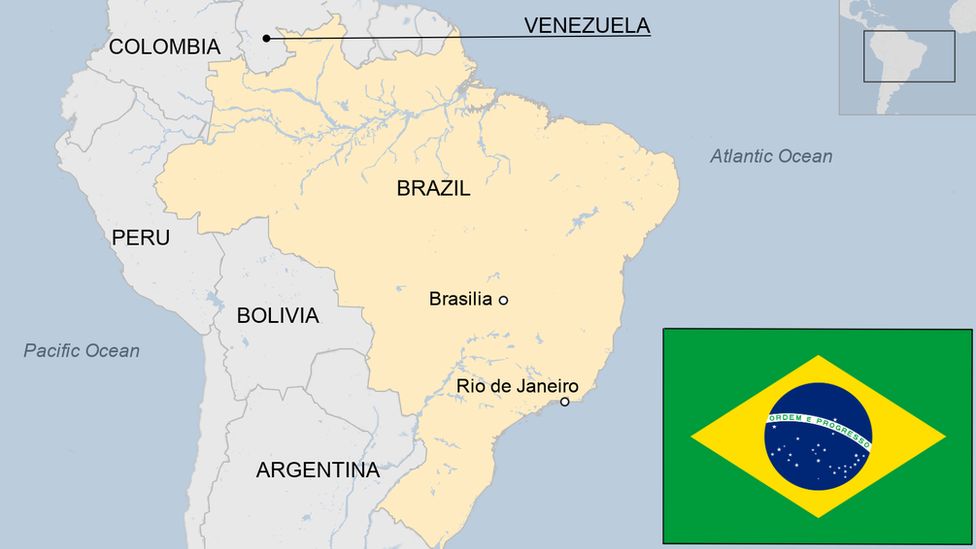Brazil country profile
- Published

Brazil is South America's most influential country, a rising economic power and one of the world's biggest democracies.
Over the past few years it has made major strides in its efforts to raise millions out of poverty, although the gap between rich and poor remains wide.
The exploitation of the Amazon rainforest, much of which is in Brazil, has been a major international worry, since the wilderness is a vital regulator of the climate.
A former Portuguese colony, Brazil has a highly diverse population, including indigenous Americans and the descendants of African slaves and European settlers.
- See more country profiles - Profiles by BBC Monitoring
FEDERATIVE REPUBLIC OF BRAZIL: FACTS
- Capital: Brasilia
- Area: 8,515,767 sq km
- Population: 217.2 million
- Language: Portuguese
- Life expectancy: 72 years (men) 79 years (women)
LEADER
President: Luiz Inácio Lula da Silva
President Luiz Inácio Lula da Silva - known widely as Lula - was sworn in as president in January 2023 after a bitterly contested election contest. The veteran left-wing politician, known widely as Lula, also led the country between 2003 and 2010 - and defeated the controversial right-wing incumbent Jair Bolsonaro in October's poll.
In his first speech, Lula vowed to rebuild a country in "terrible ruins". Shortly after being sworn in, he said he sought to instil a sense of hope in the people of Brazil and promised to "rebuild the nation and make a Brazil of all, for all".
Lula's return to the presidency came after a gap of over a decade, and a spell in prison after being convicted of corruption. The convictions were subsequently annulled in 2021.
He also promised to revoke his predecessor's controversial gun laws immediately. He has said his government would not be motivated by "a spirit of revenge", but that those who had made mistakes would answer for their errors.
MEDIA
Television dominates South America's biggest media market.
Media ownership is very concentrated and corporate giants such as Globo are the main players in broadcasting and the press.
The constitution guarantees a free press and there is vigorous political debate in the media. But freedom groups say Brazil is one of the region's most violent countries for journalists.
Brazilians are among the world's most enthusiastic users of social media.
- Read full media profile
TIMELINE
Some key dates in Brazil's history:
1500 - Portuguese land in the area and claim it for the Portuguese crown.
1822 - The son of the Portuguese king declares independence from Portugal and crowns himself Pedro I, emperor of Brazil.
1888 - Slavery is abolished. A year later, Brazil's monarchy is overthrown and a federal republic is established; in subsequent decades, government is dominated by European coffee plantation owners.
1930 - Nationalist and anti-communist Getulio Vargas comes to power in a coup; his 15-year authoritarian rule pursues state-led industrialisation and improvements in social welfare.
1939-45 - Brazil initially declares itself neutral but in 1943 joins Allies in World War Two. A Brazilian expeditionary force fights in Italy.
1945 - Vargas toppled by a coup that restores democratic rule and ushers in the second Brazilian Republic.
1960 - The capital is moved from Rio de Janeiro to the new purpose-built city of Brasilia.
1964 - Left-wing President Joao Goulart is ousted in a coup that commences two decades of military rule; the regime stifles freedom of speech and tortures opponents, but also pursues economic development.
1985 - Return of civilian government.
1988 - New constitution reduces presidential powers.
1989 - Fernando Collor de Mello becomes first directly-elected president since 1960.
1997 - Constitution changed to allow president to run for re-election.
2002 - Luiz Inacio Lula da Silva, popularly known as Lula, wins elections to become Brazil's first left-wing president for more than 40 years.
2016 - Lula's ally and successor Dilma Rousseff - is removed as president after an impeachment trial finds her guilty of financial irregularities.
2018 - Far-right candidate Jair Bolsonaro wins presidential election over centre-left Workers' Party.
2022 - Lula returns to power as Brazil's president. Bolosnaro leaves for Florida.
2023 January - Thousands of Bolsonaro supporters ransack government buildings in Brasilia. Their actions are widely condemned. The government vows to arrest those responsible.
Related Topics
- Published4 May 2023
- Published8 January
- Published22 August 2023
- Published7 February 2023
- Published4 September 2023
- Published14 February 2023
- Published4 December 2023
- Published11 December 2023
- Published13 November 2023
- Published2 June 2023